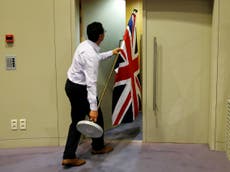A second referendum should offer Northern Ireland a choice of unions: the EU or the UK
Any Brexiteer who called for shaking off the grip of foreign powers, regaining independence and taking back control could hardly deny Ireland the chance


If a second Brexit referendum is being seriously considered, then we must use the opportunity to give Northern Ireland a much-needed choice between unions.
A no-deal Brexit will hit Northern Ireland hard, with the border issue uniquely affecting the region. With its constitutional status wholly dependent upon the consent of the people, it cannot be ignored that Northern Ireland voted by 56 per cent to remain in the EU; support for this position has since soared to 69 per cent.
Surely everyone can acknowledge that Northern Ireland is facing a different situation, and and such, should face a different question: should Northern Ireland leave the EU as part of the UK, or remain in the EU as part of a united Ireland?
The Good Friday Agreement dictates that the secretary of state for Northern Ireland may call a border poll on Irish unity, when they believe there is sufficient public appetite. Many have asked how this could be measured: let me count the ways.
In the 2017 Northern Ireland Assembly election, unionists lost their overall majority for the first time ever. As the nationalist vote grows, there is evidence that centre parties like Alliance are also becoming more in favour of Irish unity.
In May, it was reported that Theresa May did not want to risk a referendum on Irish unity. In June, a YouGov poll showed support for Irish unity at 42 per cent, while another poll by Lord Ashcroft put it at an unprecedented 44 per cent: a dramatic surge, which implies the question is now wide open.
If it’s looking this close, surely it’s high time that current secretary of state, Karen Bradley, put it to the test?
The campaign couldn’t be more divisive than the Brexit ones, and as far as major constitutional changes go, we’re already facing that. There is an obvious logical argument for debating the issue of EU membership and Irish unity simultaneously.
Any Brexiteer who called for shaking off the grip of foreign powers, regaining independence and taking back control could hardly deny Ireland the chance to debate London’s claim on the six counties.
And while conservatives and unionists may scoff at an idea as ambitious and grand as Irish unity, we owe them a debt of gratitude. Through their example of deceitful campaigning, poor planning and cowardly leadership, Irish nationalists can learn all the lessons of how not to fight a referendum.
If we have already learned anything from the Brexiteers, it’s that pie-in-the-sky visions of a utopian future are not enough. Real plans and decisive leadership are required.
A 2016 report projected that the island of Ireland could see a €35bn economic boost within eight years of reunification – but a tangible plan for getting to that point has yet to be produced.
The parties of Ireland pay various degrees of lip service to unity, but they need to produce a realistic proposal that can win over the centre ground – north and south – with a message that appeals both economically and emotionally.
Reuniting the country is a long-held nationalist dream, but an appealing vision for the role of unionists in the new country must also be drawn up.
The EU have agreed to allow Northern Ireland to automatically rejoin as part of a united Ireland. It is conceivable that with their help, Northern Ireland could remain in the customs union and single market, and keep its seats in the European parliament during any transition period, because of course unification would not happen overnight.
Parties like Sinn Fein, Fianna Fail and the SDLP have discussed embarking on a phased period of unification, perhaps across five or 10 years, during which power would be gradually shifted from London to Dublin – perhaps even retaining the devolved assembly in Belfast.
The point is, the issue is now on the table. It’s all up for debate. And none of this is any more uncertain, far-fetched or idealistic as the no-deal Brexit cliff-edge we’re being hustled towards, with absolutely no plan in sight.
There will never be a perfect time to debate Northern Ireland’s ultimate constitutional question – but this seems as fitting a moment as any.






Join our commenting forum
Join thought-provoking conversations, follow other Independent readers and see their replies